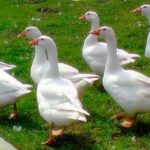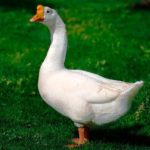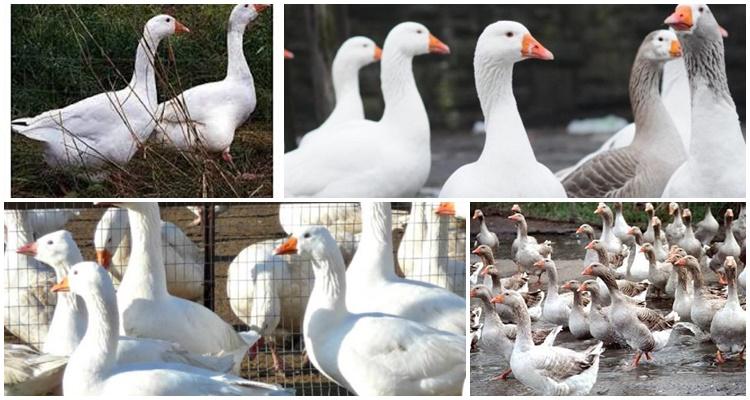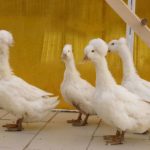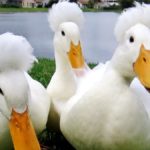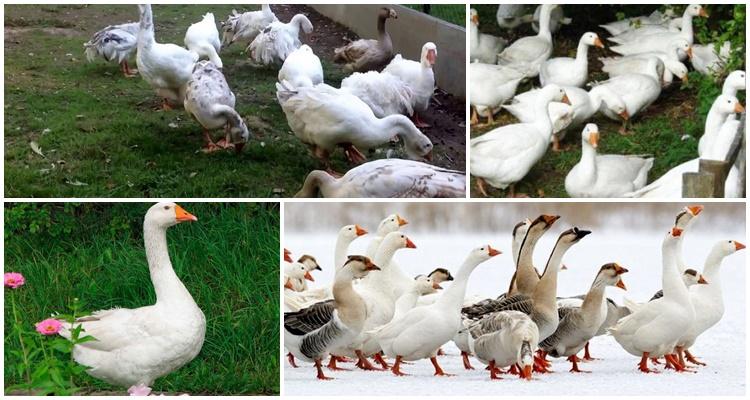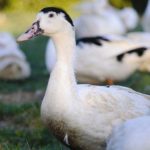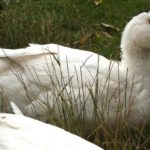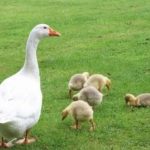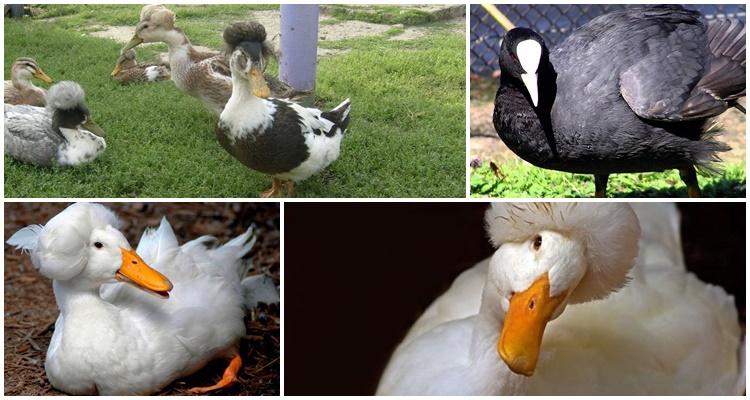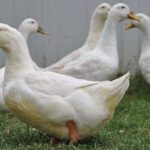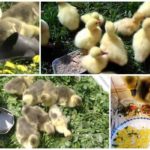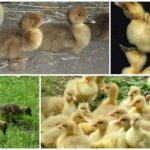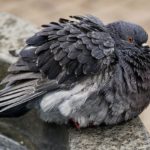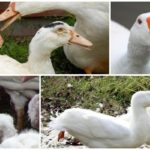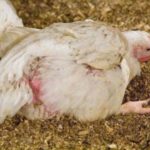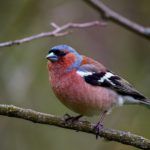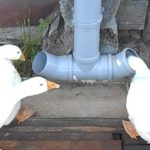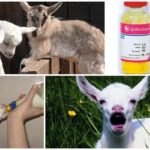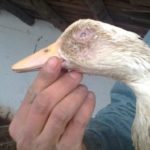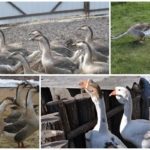Diseases in goslings are identified based on symptoms and treatment is immediately started at home. Infectious diseases are the most dangerous. To prevent them, birds are given vaccines in the first days of life. Infections are fought with antibiotics. Non-infectious diseases arise as a result of unsanitary conditions and feeding geese with low-quality feed.
- Diseases of small goslings dangerous to humans and their treatment
- Viral enteritis
- Salmonellosis
- Colibacillosis
- Pasteurellosis
- Coccidiosis
- Aspergillosis
- Infectious cloacitis (neisseriosis)
- Worms
- Diseases that are not dangerous to humans
- Vitamin deficiency D
- Stomatitis
- Diarrhea
- Cannibalism
- Esophageal blockage
- Non-infectious cloacitis
Diseases of small goslings dangerous to humans and their treatment
Infectious diseases of geese, especially in the early stages of life, can lead to the death of birds. Viruses, bacteria, fungi and parasites that infect goslings are also dangerous to human health. It is advisable to prevent the development of infectious diseases, that is, to carry out a number of preventive measures. All infections are treated with antibiotics. You can buy Baytril, Levomycetin or Bicillin-3 and add it to drinking water at the first sign of illness in geese.
Viral enteritis
Enterovirus affects only incubator-bred geese up to three weeks old. The pathogen is even cultivated on goose embryos; the source of infection is sick and recovered birds. Sick goslings lose their appetite. Birds sit motionless in one place, sneeze, and may have snot. In addition to a runny nose, sick chicks experience diarrhea, dermatitis, and feather loss. Geese die on days 5-14 of life.
Salmonellosis
This infectious disease is especially dangerous for goslings under 1 month of age. Sick birds and domestic animals can be sources of infection. The bacteria that cause the disease live for a long time in droppings, water bodies, and soil. Salmonellosis can be recognized by the depressed state and inactivity of birds, nasal discharge, and white diarrhea. Sick goslings experience convulsions, the chicks fall to the side and twitch their legs. More than 50 percent of sick birds die.
All that needs to be done in this case is to give the goslings water with antibiotic. To treat birds, you can use Levomycetin, Enrofloxacin, Baytril, Gentamicin sulfate, Furazolidone, Furagin.Antibacterial agents are given to sick birds for 5 days. At the same time, goslings are prescribed probiotics (“Bifinorm”, “Bifidumbacterin”) for 7-14 days. As a preventative measure, on the 2-3rd day of life, geese are given a drug called “Waterfowl Salmonellosis Vaccine” dripped into their mouths.
Colibacillosis
Colibacillosis is caused by intestinal bacteria. The pathogen lives in droppings, contaminated feed, bedding and even on the surface of eggs. Symptoms: lethargy, refusal to eat, diarrhea, discharge from the eyes; in severe cases, pneumonia and fever are possible. Without treatment, the goslings die. Birds are treated with antibiotics (drugs are added to drinking water). Additionally, goslings are prescribed probiotics. As a preventative measure, geese are given a vaccine against colibacillosis.
Pasteurellosis
Bacteria that cause the death of young geese can live on shells, in droppings, or on litter. Pathogens are transmitted from sick and recovered birds. Sick goslings refuse to feed, breathe heavily, wheeze, and have nasal discharge and diarrhea.
Antibiotics are used for treatment (Levomycetin, Bicillin-3). Live vaccines are used for prevention.
Coccidiosis
The disease is caused by parasitic protozoa. The sources of infection are sick birds. Pathogens can live in feed, soil, and litter. Infection occurs through the digestive tract. Goslings become ill at 7-30 days of life. Sick chicks experience depression, diarrhea, and lack of appetite. For the treatment of eimeriosis, Coccidin, Iramin, Rigecoccin, Robenidine are prescribed.
Aspergillosis
The disease is caused by pathogenic fungi. Pathogens can live on litter, soil, and feed. This disease often affects goslings that live in poultry houses with poor ventilation.Fungal spores inhaled by geese germinate in the respiratory system. Sick goslings are inactive, breathe heavily, and experience wheezing, coughing, conjunctivitis, diarrhea, and convulsions. Antifungal drugs (Gamicin) are used for treatment.
Infectious cloacitis (neisseriosis)
A bacterial disease that can be recognized by hyperemia of the cloacal mucosa, the formation of fibrinous scabs, bleeding erosions, swelling of the affected tissues, and inflammation of the penis. Geese become infected during the mating period and through infected litter. Antibiotics are used for treatment (“Bicillin-3”, “Levomycetin”).
Worms
Goslings can become infected with worms, the eggs of which are found in dirty bedding, soil, or poor-quality feed. On days 7-14 of the birds’ life, it is recommended to add an anthelmintic agent (“Levamisole”, “Tetramizole”) to the water for preventive purposes. Repeated deworming is carried out every 2-3 months.
Diseases that are not dangerous to humans
Some diseases of goslings are not dangerous to humans. True, diseases often arise due to the fault of people (as a result of improper feeding and poor care of the bird).
Vitamin deficiency D
The disease develops when there is a deficiency of ultraviolet radiation and vitamins in feed. If goslings get vitamin deficiency, they experience rickets, slowed growth, and curvature of the bones. The disease can be prevented by giving chicks cottage cheese from the moment of birth, and also by adding calcium, chalk, and pharmaceutical preparations with vitamin D to the food.
Stomatitis
The disease occurs when geese are poorly fed and lack vitamins. With stomatitis, goslings experience inflammation of the mucous membrane, stretching of the floor of the mouth, and prolapse of the tongue. A putrid odor emanates from the mouth of a sick bird.It is recommended to treat geese for stomatitis by cleansing the oral cavity of feed masses and rinsing with a disinfectant (Rivanol, Furacilin, herbal decoction).
Diarrhea
Diarrhea occurs as a result of some kind of infectious disease or as a result of feeding low-quality (moldy, sour) feed. Diarrhea occurs in birds that are kept in unsanitary conditions or swim in dirty ponds. Signs of the disease: frequent bowel movements, liquid feces of a yellowish-green color.
If the disease is infectious, birds are fed water with antibiotics. During the treatment process, errors in feeding and keeping geese must be eliminated. In case of diarrhea caused by poor-quality feed, birds are given weak disinfectant solutions (lactic, succinic acid, potassium iodide, ferrous sulfate). Be sure to prescribe probiotics (“Bifido-bacterin”) or feed them with cottage cheese and yogurt.
Cannibalism
The disease occurs as a result of metabolic disorders and increased excitability of the nervous system of geese. The cause of cannibalism can be a lack of protein, amino acids, vitamins and minerals. The desire to peck each other in birds arises at the sight of blood or as a result of starvation. Signs of cannibalism are bleeding wounds.
Geese must be provided with nutritious food from the moment of birth. This is the main measure for the prevention of cannibalism. At the time of exacerbations, anti-stress premixes are added to the birds’ food.
Esophageal blockage
In case of blockage, the esophagus becomes overfilled with food. Muscular atony and obstruction are observed. The disease occurs in young birds that are fed dry food and not taken out for boat trips or grazing.Grain stagnates in the bird's esophagus, and when moisture gets inside it swells. In severe cases, asphyxia is possible.
As a treatment, it is recommended to clear the esophagus of feed, introduce vegetable oil inside, and not feed the birds anything for 24 hours. For cleansing, massage and rinsing with vodka are prescribed. For prevention purposes, it is advisable to always give food at the same time as water.
Non-infectious cloacitis
Inflammation of the mucous membrane of the cloaca is observed in geese during the period of intensive egg laying. The cause of the disease is unsanitary keeping of geese and injuries to the oviduct. In sick birds, egg laying decreases or stops, and defecation becomes difficult. Near the cloaca, feathers become dirty and fall out. Treatment begins with cleansing procedures. The cloaca is cleaned with Vaseline and herbal decoction. Tampons with syntomycin ointment are inserted inside.


